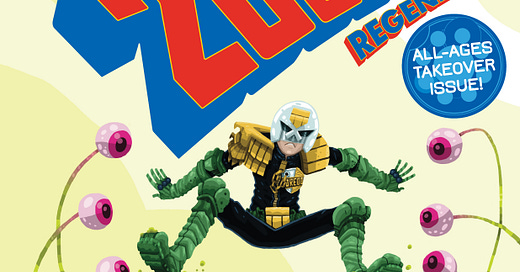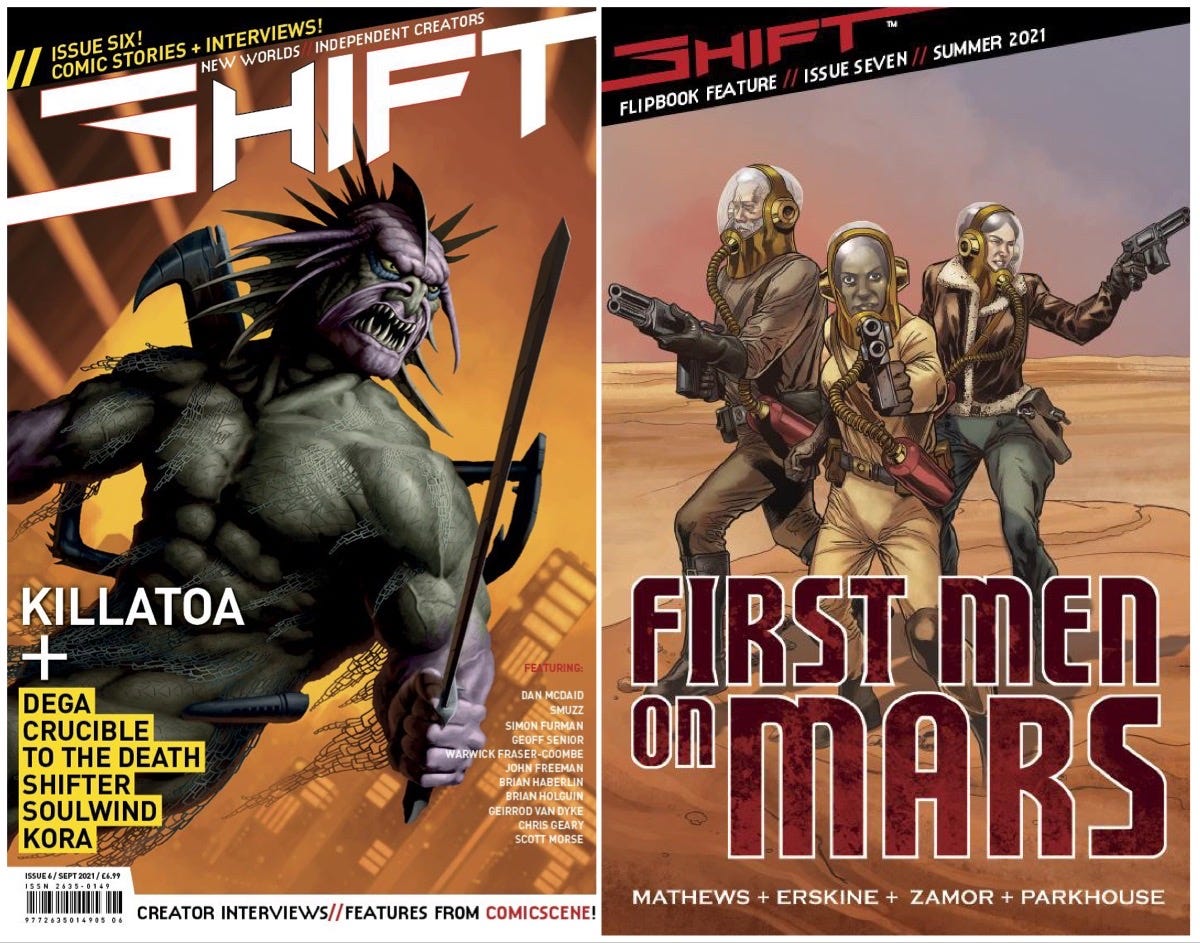This week, British comics publisher Rebellion releases their latest 2000AD Regened “All Ages Takeover” edition of the weekly SF comic, the third of four this year. The title’s editorial team are clearly, and, quite rightly, in my view, determined to ensure the Galaxy’s Greatest Comic’s continued success, by trying to attract new readers.
The new issue, on sale in newsagents and comic shops this Wednesday has, sadly, prompted some criticism from older 2000AD fans, a vocal few complaining that the Regened project is a waste of their galactic groats.
I beg to differ. Quite apart from the fact that we’re talking just four issues a year devoted to this reinvention of classic 2000AD characters, and some new ones introduced, too, how is any long-running comic going to survive if it doesn’t shake things up now and again, and do its best to attract new readers to join the many and varied ranks of the Squaxx dek Thargo who have been reading the title since it began, way back in 1977, myself included?
Lon-running, long established British comic characters face an ongoing challenge to continue to be a commercial success. Especially as the property ages, and the vehicles for their continued success - principally, weekly cover to cover comic-strip dominated publications - are few and far between, largely supplanted by license-driven, more magazine format titles. A change that began to really gather pace in the 1980s after the earlier success of Star Wars Weekly, and is now hard to challenge on the news stand. (There are other factors, but I won’t get into things like distribution and marketing costs here).
To be absolutely blunt, the core audience for 2000AD, the much appreciated longtime fan who was there when Judge Dredd and Strontium Dog were young, aren’t getting any younger, and that’s inevitably a worry for the owners of the Galaxy’s Greatest Comic, who have invested heavily in the title’s long term commercial success. They need to keep picking up new readers to do that, which is what the 2000AD Regened project, offering new takes in much-liked, long running characters, hopes to achieve.
Let’s be realistic here. When it comes to the original fandom of other long standing British comic characters and titles, we’re literally, sadly, seeing them vanish as time marches on. The first fans of Dan Dare’s who followed the popular character in the original Eagle are in their eighties, or older. Consequently, attracting a commercially viable new following is hard if you’re seeking to rely on that valued but now smaller core support. I should know; I was heavily involved in developing the Dan Dare Audio Adventures project and trust me, we darn well tried to make it work, and gained welcome critical acclaim for it. But not, unfortunately, enough commercial traction to keep it going.
The same is happening with the fandom for 1960s comics like TV Century 21, although the properties that inspired it, like Thunderbirds and Captain Scarlet, remain “evergreen”.
Right now, the “nostalgia factor”, commercially, is currently more attuned to the 1980s, as evidenced by the success of TV series such as Stranger Things. Just last week, I listened in on an auction as bids on a small set of Terrahawks slides went way beyond estimated bids - and far and away much higher than other lots for earlier Gerry Anderson series you’d have thought would have attracted the greater hammer price.
Reinvention, while respecting the core values of a character that made them a success in the first place, is key to continuing commercial success for longtime comics properties, in my opinion. And while I’m being blunt, without that commercial success, you won’t have the source material for future fandom, in all its disparate forms, to reminisce and argue about ten, twenty years and beyond. Because it simply won’t be getting published.
Disney understands this. Hasbro, owners of Transformers, understand this. DC Thomson Media and Beano Studios get this, and their reinvention of their weekly humour comic, BEANO, while holding true to the core of characters like Dennis and Minnie the Minx, first published in the 1950s, has paid off with weekly average sales of 58,000, the highest they’ve been in ten years or so.
So yes, I get why 2000AD are experimenting with Regened, although it’s my feeling that the project would be better served by a new comic from Rebellion, but any hopes for that - and surely, the company must have been considering it - were bushwacked by a little thing called the Pandemic. (Personally, I’d actually love to see a new Buster or Whizzer and Chips before a new adventure comic, but that’s my nostalgia head talking, not playing to Rebellion’s strengths).
Rebellion have successfully reinvented Roy of the Rovers, so it makes absolute commercial good sense to try to do the same for 2000AD, its tent pole title. I wish them every success.
Some unashamed plugs for my own projects…
“Crucible”, my science fiction adventure created with former 2000AD artist Smuzz continues in SHIFT Issue 7, on sale soon, an issue by the way that features a fantastic first look at a new crowdfunded comics project written by Paul L. Matthews, with art and world building by Gary Erskine, “First Men on Mars”, who which launches soon.
I’ve also just submitted my script for the first issue of the Pilgrim 2121 comic project from B7 Comics, tying in with their new transmedia project which will be trailed in SHIFT Issue 8, in a special “ashcan” style strip featuring art by Wamberto Nicomedes and a cracking cover by Alex Ronald. The regular series will be drawn by Marvel artist Neil Edwards.
Plus, as well as ongoing work on downthetubes, just for fun, I’m writing a Doctor Who newspaper strip, with art by Danny Cushion, and yes, it is a reinvention of an old project I came with back in my time as editor of Doctor Who Magazine.
Because, yes, I can still be a fan, too…
Have a great week, all.
John Freeman







I totally agree. Without reinvention 2000ad will die with its current audience.
I also agree that a new all ages title would be a good idea running alongside it.
And when I say "all ages" I mean real all ages, not simplistic kids stuff that talks down to the readers, material that is aim just above the target audience that challenges them just like 2000ad did for us 30 years ago.
That way as the new readers grow out of the all ages stuff they can organically move into 2000ad and keep it alive.